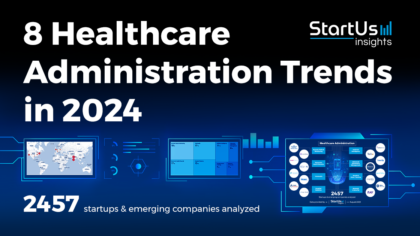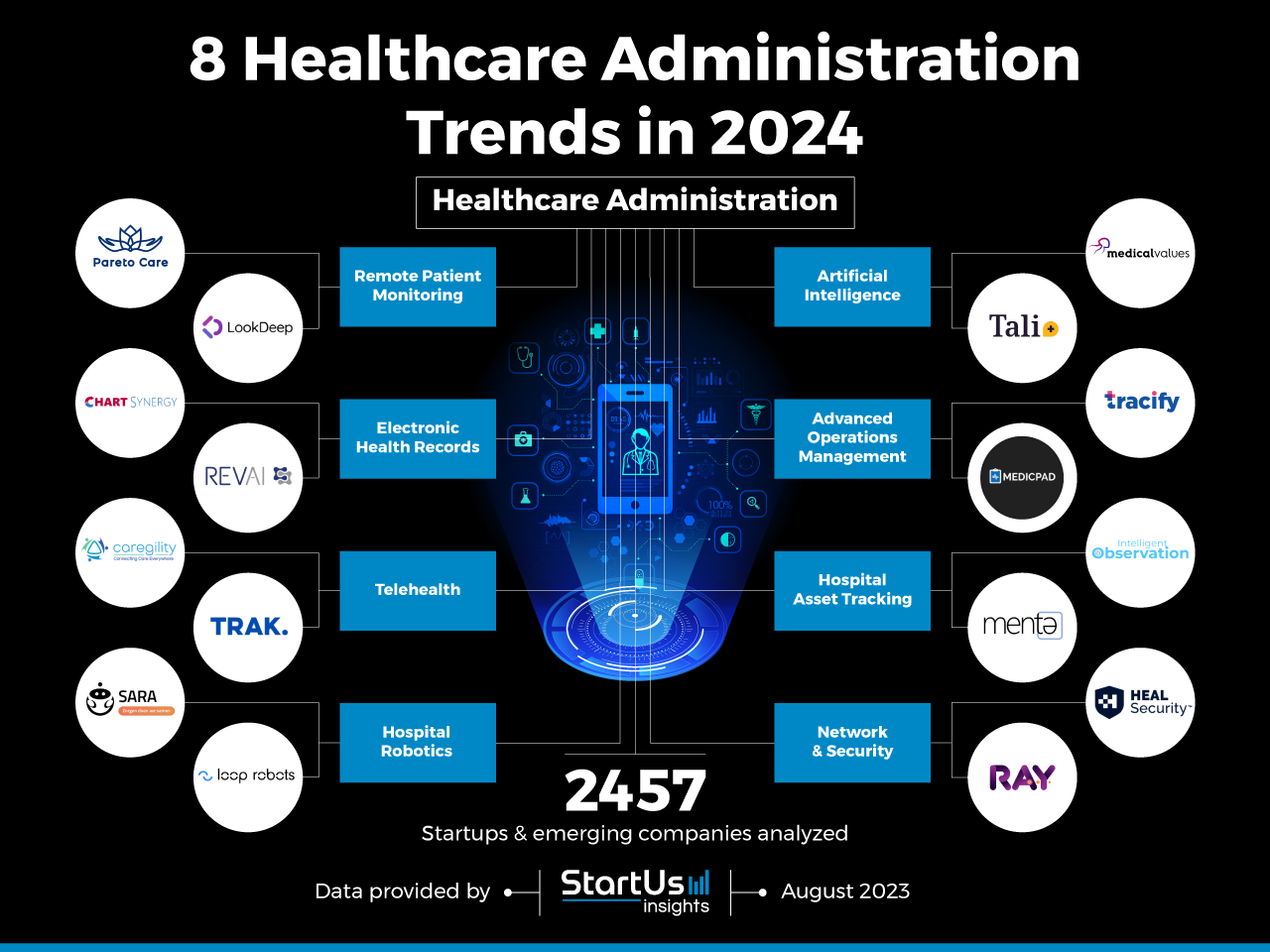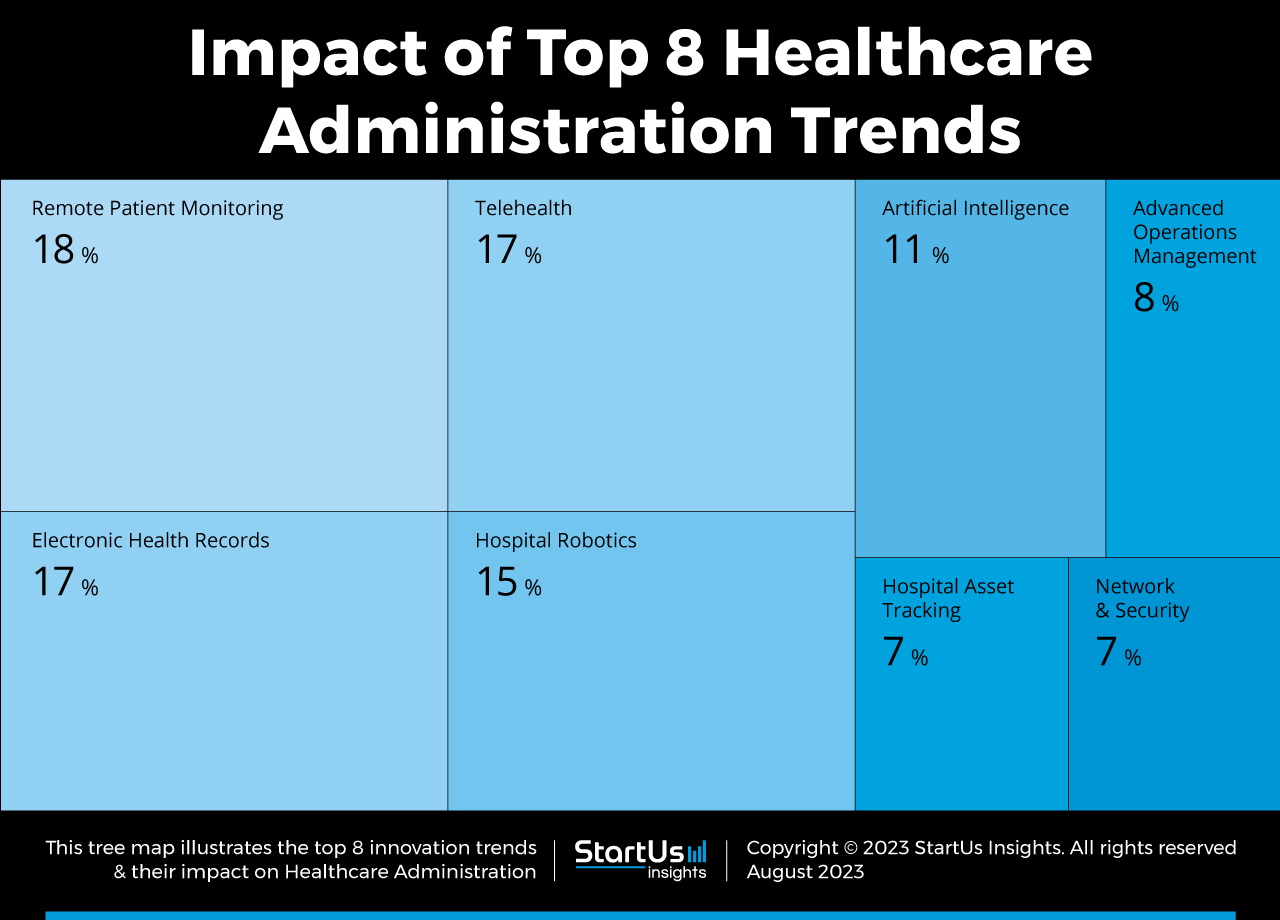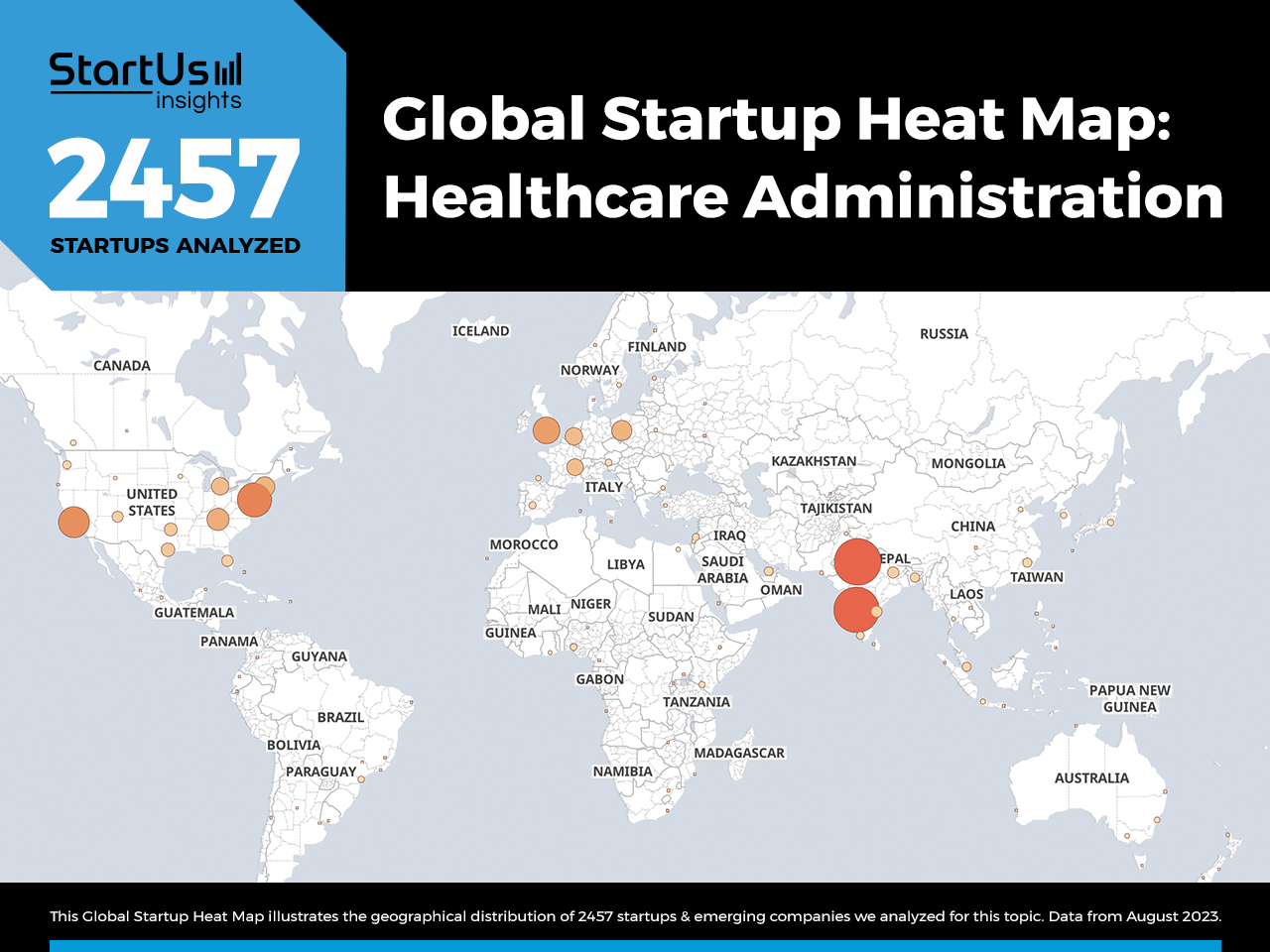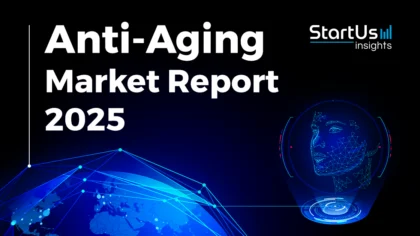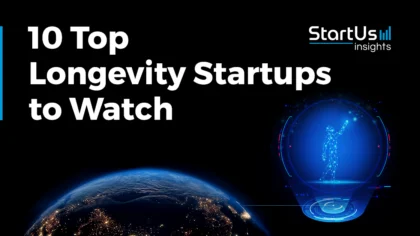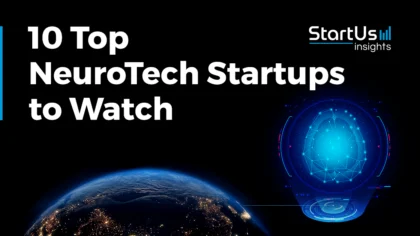Accelerate Productivity in 2025
Reignite Growth Despite the Global Slowdown
Hospitals, medical clinics, and healthcare facilities address staff burnout and enhance operational efficiency to ensure efficient care delivery. The healthcare industry is integrating technological and digital innovations to improve administrative processes. This report provides an overview of healthcare administration trends and innovations, highlighting how remote patient monitoring (RPM), electronic health records (EHRs), telehealth, and online rehabilitation improve hospital administration. These advancements streamline workflows, reduce administrative burdens, and improve patient outcomes. Read more to find out how these trends and innovations advance your healthcare business.
This article was last updated in August 2024.
Innovation Map outlines the Top 8 Healthcare Administration Trends & 2457 Promising Startups
For this in-depth research on the top global healthcare administration trends and startups, we analyzed a sample of 2457 global startups & scaleups. This data-driven research provides innovation intelligence that helps you improve strategic decision-making by giving you an overview of emerging technologies and current trends in healthcare administration. In the Healthcare Administration Innovation Map, you get a comprehensive overview of the innovation trends & startups that impact your company.
Top 8 Healthcare Administration Trends (2025)
- Remote Patient Monitoring
- Electronic Health Records
- Telehealth
- Hospital Robotics
- Artificial Intelligence
- Advanced Operations Management
- Hospital Asset Tracking
- Network & Security
Want to explore all healthcare administration innovations & trends?
These insights are derived by working with our Big Data & Artificial Intelligence-powered StartUs Insights Discovery Platform, covering 4.7M+ startups & scaleups globally. As the world’s largest resource for data on emerging companies, the SaaS platform enables you to identify relevant technologies and industry trends quickly & exhaustively.
Tree Map reveals the Impact of the Top 8 Healthcare Administration Trends in 2025
Based on the Healthcare Administration Innovation Map, the Tree Map below illustrates the impact of the Top 8 Healthcare Administration Trends in 2025. Reducing the manual workload of healthcare providers while improving operational efficiency is imperative for advancing healthcare administration. Consequently, hospitals and other healthcare institutions are focusing on digitalization and automation. They leverage remote patient monitoring through video technologies and medical wearables, whereas EHR improves visibility into patient conditions.
Further, deploying robotics automates operational activities like food and medicine delivery, disinfection, and patient engagement. Advances in telehealth allow clinicians to provide medical services virtually, curbing the need for physical visits and saving time. Lastly, the other top trends in health administration are hospital asset tracking, advanced operations management, artificial intelligence (AI), and cybersecurity. They collectively improve healthcare operations and infrastructure security.
Global Startup Heat Map covers 2457 Healthcare Administration Startups & Scaleups
The Global Startup Heat Map below highlights the global distribution of the 2457 exemplary startups & scaleups that we analyzed for this research. Created through the StartUs Insights Discovery Platform, the Heat Map reveals that India sees the most healthcare administration startup activity, followed by the US.
Below, you get to meet 20 out of these 2457 promising startups & scaleups as well as the solutions they develop. These 20 startups are hand-picked based on criteria such as founding year, location, funding raised, and more. Depending on your specific needs, your top picks might look entirely different.
Top 8 Healthcare Administration Innovation Trends for 2025
1. Remote Patient Monitoring
Hospitals traditionally assign sitters for high-risk patients, which is cost- and labor-intensive. Additionally, the lack of efficient patient stratification leads to poor management of patients who are potentially at risk. To resolve this, healthcare startups are developing advanced video solutions that enable remote patient monitoring.
Such AI-based solutions monitor patients in real-time and send alerts to the workers if immediate care is required. At the same time, medical wearables track various body parameters, like sugar levels and heart rates, to notify healthcare providers of abnormalities. Some startups also make smart sensor-integrated hospital beds for patient monitoring.
LookDeep Health builds a Clinical Action Platform
LookDeep Health is a US-based startup that develops a clinical action platform for hospitals. The platform has three components – Patient Central, Care Connect, and Family Care Connect. Patient Central enables real-time centralized monitoring of patients while highlighting the ones that need special attention. Care Connect is a mobile app for doctors and nurses to access patient information, which also features virtual rounds and remote consultations.
Finally, Family Care Connect is a hospital-controlled mobile app that lets family members of patients communicate with the patients remotely. Thus, LookDeep reduces burnout for healthcare providers by offering telesitting, tele-emergency rooms (ERs), virtual nursing, and e-intensive care units (ICUs).
Pareto Care makes Medical Wearables
US-based startup Pareto Care manufactures medical wearables. Its products, Wrist Monitor and Chest Monitor, use biosensors to continuously track twenty-two medical parameters. This includes a cardiac index, stroke volume, oxygen saturation, skin temperature, fall detection, and sleep quality.
Pareto Care’s AI-based software allows nursing staff to monitor all department-level patients on one screen and receive alerts in case of any anomalies. Further, it predicts acute heart failure decompensation 30 days before occurrence, enabling clinicians to take timely actions.
2. Electronic Health Records
As hospitals deal with large amounts of patient data, manual maintenance of medical records is time-consuming and prone to human errors such as misinterpretations. As a result, platforms providing and integrating electronic health records (EHR) are on the rise.
They store every minute detail of patient data digitally in software platforms, allowing physicians to access patient records remotely. Moreover, this enables doctors are able to better diagnose and treat patients as their medical history will be available in one place. EHRs are either on-premise physician-hosted, in which doctors locally manage their data, or remotely hosted by third parties through cloud computing.
ChartSynergy develops Medical Records Software
Georgian startup ChartSynergy offers medical records software. It enables quick documentation of clinical notes into organized patient summaries. The startup’s integrated electronic prescription system improves efficiency and eliminates illegible prescriptions and oral miscommunication.
Additionally, electronic lab test requests and on-demand access to reports facilitate a faster information flow and reduce test duplications. The software also checks prescriptions for drug-to-drug interactions and allergies to notify the physicians upon detecting problems. This way, ChartSynergy allows medical professionals to efficiently gather, manage, transfer, and analyze patient health data.
REVAI provides a Collaborative Medical Platform
REVAI is an Argentine startup that makes a collaborative medical platform. It digitally stores patient medical records for clinics and hospitals to manage patient health data efficiently. Moreover, the platform issues digital medical passports that allow patients to access and share their health data conveniently. It also anonymously shares this encrypted data with doctors, universities, and laboratories, allowing collaborative research in the healthcare and pharma sectors.
3. Telehealth
The increasing need for social distancing due to the COVID-19 pandemic generated high interest in telehealth solutions. However, patients and physicians still prefer remote consultation even after removing the pandemic restrictions. Some of the major aspects of this technology include teleconsultation, telenursing, telepharmacy, and telerehabilitation.
For example, teleneuropsychology refers to virtually assessing and providing consultation to patients who suffer from cognitive disorders. On the other hand, telepharmacy is the delivery of medicines and other pharmaceutical care products to patients. Telehealth solutions are thus convenient for patients, especially in remote areas with no or limited access to healthcare.
Caregility advances Virtual Care
US-based startup Caregility offers telehealth products that enable virtual care. The startup’s software, iObserver, provides virtual observation for up to 12 patients and displays their vitals on a single screen. It uses continuous live video and audio feeds from a wall-mounted or cart-access point-of-care system in each patient room.
The software analyzes the feeds to identify potential issues and alert the nurses and doctors for quick intervention. The startup’s other product, iConsult, supports remote medical consultations, enabling virtual outpatient encounters and inpatient rounding.
TRAK enables AI-Powered Telerehabilitation
TRAK is a Spanish startup that advances AI-powered telerehabilitation for geriatrics, chronic pain management, sports rehabilitation, neurorehabilitation, and respiratory rehabilitation. The startup’s software utilizes cameras in cell phones, tablets, or laptops to monitor the exercise that patients perform. It then detects incorrect movements and positions in real-time. This way, TRAK enables healthcare professionals to remotely monitor their patients and prescribe quality digital treatments.
4. Hospital Robotics
Robots in the healthcare sector are advancing surgeries, delivery fulfillment, disinfection efforts, and much more. Surgical robots allow surgeons to have more precise control over various surgical procedures. This significantly reduces surgical errors and the complications associated with them.
On the other hand, delivery robots are useful for performing mundane tasks such as delivering medicines and meals to patient beds. This frees up the time of healthcare personnel, enabling them to focus on more urgent patient medical needs. To further reduce staff burnout, startups are building care or companion robots that ensure patient cleanliness, check their vitals, offer them emotional support, and improve patient engagement.
SARA Robotics manufactures a Care Robot
Dutch scaleup SARA Robotics makes an autonomous care robot that assists elderly and vulnerable patients. It uses voice-enabled technology to interact with patients and connect them with healthcare professionals whenever required. The assistive robot reminds patients about their doctor appointments and medications.
Further, it simulates the cognitive abilities of patients by challenging them through short mind games. Thus, SARA Robotics enables aged patients to receive personalized care while allowing healthcare institutions to tackle the problem of staff shortage.
Loop Robots develops a Disinfecting Robot
Loop Robots is a Dutch startup that provides a disinfecting robot for hospitals. The mobile robot, SAM, automatically disinfects the air and surfaces in patient rooms using germicidal UV-C technology. It autonomously drives around objects and features safety measures to avoid human exposure to UVC radiation.
Further, hospital staff are able to request cleaning via the startup’s mobile app and SAM notifies them once it finishes the disinfection tasks. This way, Loop Robots advances autonomous disinfection for hospitals, allowing the staff to focus on more urgent tasks.
Find out how 10 emerging technologies shape your industry!
5. Artificial Intelligence
Process automation and healthcare analytics are the primary use cases of AI in hospitals and healthcare administration. Machine learning (ML) and computer vision analyze medical images to detect various diseases, enabling advanced diagnostics. This allows doctors to detect conditions faster and intervene promptly. ML also helps in patient stratification.
For this, ML models predict the future state of patients based on their present clinical condition and available medical history. Additionally, AI-powered virtual assistants allow clinicians to digitize medical notes to save time and increase efficiency conveniently. Towards hospital administration, AI automates inventory management, clinical documentation, and revenue cycle management, among others.
medicalvalues offers Integrated Diagnostics
German startup medicalvalues enables integrated diagnostics. The startup’s AI-powered medical diagnostics platform integrates different diagnostic information regarding radiology, pathology, oncology, rheumatology, and nephrology in a dashboard. It then breaks down medical data silos using standards like Systematized Nomenclature of Medicine Clinical Terms (SNOMED CT) and Logical Observation Identifiers Names and Codes (LOINC).
This enables doctors to establish connections between data sets and understand how symptoms, imaging results, and laboratory parameters influence each other. They also get an explanation of the recommended diagnostic steps. Thus, medicalvalues improves the patient experience by personalizing diagnostic procedures.
Tali AI offers a Voice-enabled Virtual Assistant
Tali AI is a Canadian startup that offers a voice-enabled virtual assistant for doctors. Its medical scribe feature allows physicians to dictate their notes, which the assistant types directly into EHR systems. The startup offers a companion app to transcribe notes using natural language processing (NLP) algorithms, medical language models, and speech recognition. Additionally, the medical search feature provides insights into drug dosage and medical questions by analyzing recent medical research and medication monographs, saving time.
6. Advanced Operations Management
Healthcare professionals need to deal with massive amounts of operational tasks that are imperative for efficient care delivery. To make such processes more effective, startups develop advanced operations management solutions. This includes solutions for operation theater (OT) management, laboratory information systems, discharge summary digitalization, billing management, visitor management, hospital recruitment, and staff workflow management. These solutions not only save time but are also cost-effective. They reduce manual data entry and paperwork while enabling hospitals to allocate staff and resources for complex tasks.
elmeas builds a Hospital Operations Management Platform
UK-based startup elmeas streamlines hospital operations with its modular management software. It manages patient journeys by capturing all procedures performed, storing records, and ensuring efficient workflow management. The software also features appointment and shift management, device integration for direct data recording, and automated document and billing generation.
The software integrates with existing systems like Medico and SAP to improve operational efficiency and reduce administrative burdens. This improves patient care quality, reduces paperwork, and optimizes hospital resource utilization.
MedicPad provides Patient Management Solutions
MedicPad is a Dutch startup that makes patient management solutions. It provides digital forms to reduce the time spent on filling medical forms and self-check-in kiosks to streamline patient onboarding. Further, the startup’s activity tracker allows caregivers to clock in and out according to treatment as well as view and manage patient-specific care plans. MedicPad’s analytics and reporting solution enables hospital management to keep track of nursing staff and offers digital audit logs.
7. Hospital Asset Tracking
Hospitals have numerous expensive assets such as diagnostic equipment, surgical instruments, monitors, and wheelchairs, among others. Tracking these items effectively is only possible with advanced technologies like Bluetooth tags and other connected devices. For example, radio-frequency identification (RFID) and barcodes enable real-time tracking of medical assets.
This significantly reduces the chances of items getting misplaced, preventing the wastage of hospital resources. Moreover, such asset tracking solutions make sure that the right equipment is always present where they are needed, improving asset utilization and efficiency.
Intelligent Observation advances Real-Time Hospital Asset Tracking
Intelligent Observation is a US-based startup that facilitates real-time hospital asset tracking. The startup’s technology, GeoFi Sensor Fusion, allows hospital staff to locate specific assets in real-time without new infrastructure. It utilizes geomagnetic imprints of hospital buildings, WiFi access point scanning, and motion detection to pinpoint assets with room-level accuracy. This way, the asset tracking system enables hospitals to reliably locate equipment, free up staff resources, analyze asset usage, decrease wasteful spending, and improve overall patient care.
mente streamlines RFID-based Surgical Instrument Tracking
US-based startup mente enables RFID-based surgical instrument tracking. The startup installs its autoclavable tags on the hospital surgical instruments. This enables real-time asset tracking and usage analysis. The doctors are able to perform surgery as usual while the solution automatically captures instrument usage data in the background. This way, mente makes sure that care teams have exactly what they need and nothing in excess, avoiding confusion and making the process more organized and efficient.
8. Network & Security
Healthcare institutions deal with tons of sensitive data such as patient information and health insurance details. This makes the healthcare sector one of the most popular targets for malicious hackers. Moreover, hospitals use a lot of connected devices, including the internet of things (IoT), which again puts them at risk. This makes it further difficult for healthcare organizations to adhere to patient data compliance regulations like the Health Insurance Portability and Accountability Act (HIPAA). As a result, startups create cybersecurity solutions tailored for AI and the security of things (SoT) to increase protection.
SwordEye advances Healthcare Cybersecurity
SwordEye offers a platform dedicated to safeguarding patient health data from cyber-attacks. This technology specifically targets IoT and health systems, detecting potential cybersecurity vulnerabilities. The solution discovers and monitors all known and unknown digital assets of healthcare organizations like web, backend technologies, and IoT devices. SwordEye also tracks malicious javascripts, blacklists IPs&FQDNs, CVE&CPE, and end-of-life applications. Healthcare facilities are able to see their cybersecurity risk score over 40 risk criteria in 7 main categories.
Ray offers Hospital SoT
Singaporean startup Ray offers an SoT solution for hospitals. It uses machine learning and a cloud-based device knowledge base of IoT devices to provide continuous vulnerability assessment and threat response. Further, Ray’s cyberthreat detection solution, Vigil, features a network audit that suggests network loopholes, ensuring new devices and software adhere to privacy and security norms. This protects patient data such as medical history, financial details, medical insurance information, and more from hackers’ attacks.
Discover all Healthcare Administration Trends, Technologies & Startups
The future of healthcare administration is not limited to the above-mentioned trends. For example, as biometrics enables quick and secure access to sensitive data, the technology shows an upward growth to ensure data privacy and safety. Likewise, immersive technologies like virtual reality (VR) and augmented reality (AR) are being extensively used for medical training. They are also very effective for advancing telehealth with virtual exposure therapy. These innovations, among others, will improve the efficiency of healthcare operations and improve care delivery.
The Healthcare Administration Trends & Startups outlined in this report only scratch the surface of trends that we identified during our data-driven innovation and startup scouting process. Among others, connected devices, AI, and cybersecurity will transform the sector as we know it today. Identifying new opportunities and emerging technologies to implement into your business goes a long way in gaining a competitive advantage. Get in touch to easily and exhaustively scout startups, technologies & trends that matter to you!
